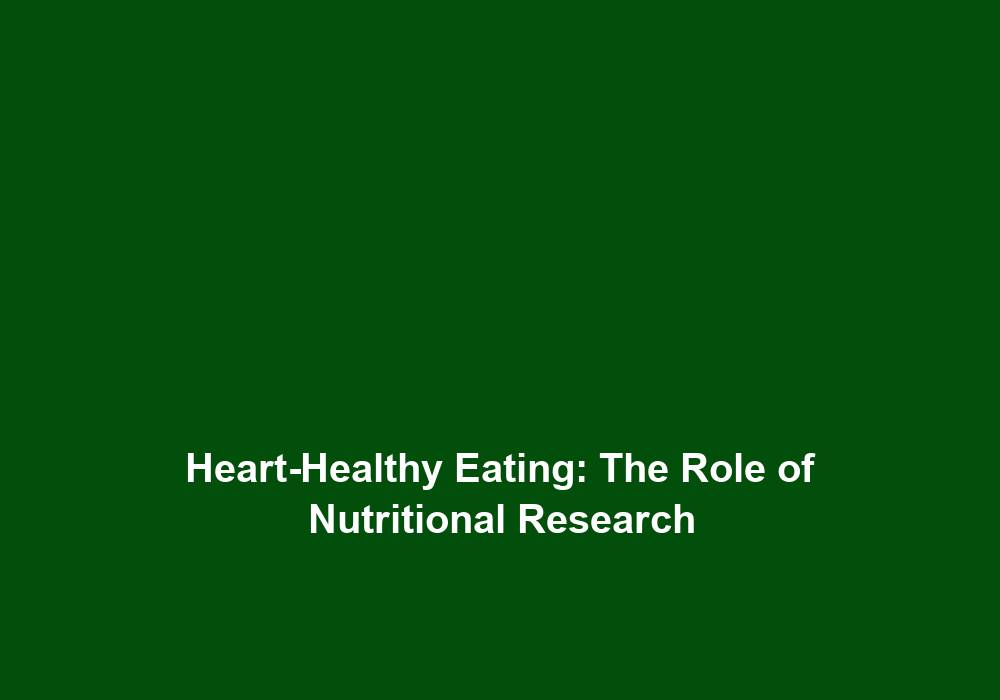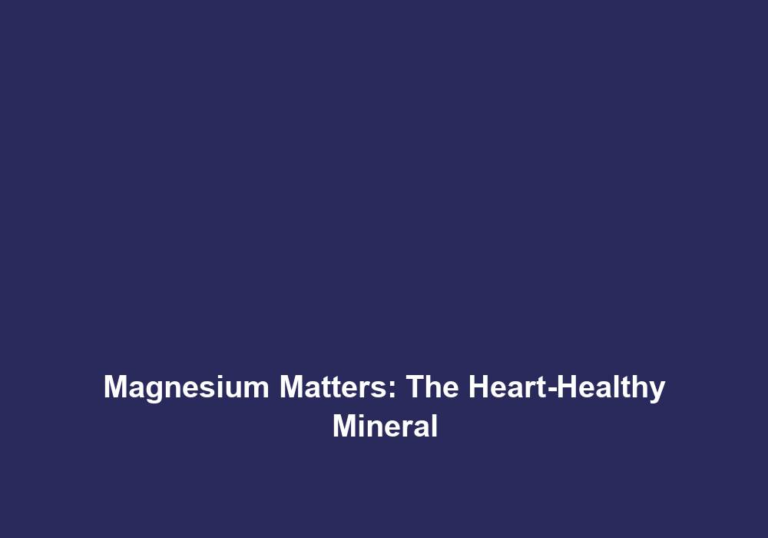Heart-Healthy Eating: The Role of Nutritional Research
The importance of heart-healthy eating cannot be overstated when it comes to maintaining overall well-being. Consuming a balanced diet that is rich in essential nutrients can significantly reduce the risk of heart disease and other cardiovascular conditions. In this article, we will explore the significant role nutritional research plays in understanding the impact of diet on heart health and provide valuable insights into incorporating heart-healthy eating habits into our daily lives.
Understanding Heart Disease and its Risk Factors
Before delving into the role of nutritional research, it is crucial to comprehend heart disease and its risk factors. Heart disease refers to a range of conditions that affect the heart, including coronary artery disease, heart attacks, and heart failure. Several factors contribute to the development of heart disease, including high blood pressure, high cholesterol levels, obesity, diabetes, and a sedentary lifestyle.
Understanding the risk factors associated with heart disease is essential for implementing effective prevention strategies. High blood pressure, also known as hypertension, is a significant risk factor that can be influenced by diet. Consuming a diet high in sodium can lead to increased blood pressure, which in turn increases the risk of heart disease. Similarly, high cholesterol levels, particularly high levels of LDL cholesterol, can contribute to the development of heart disease. By understanding these risk factors, we can make informed choices about our dietary habits to reduce the likelihood of developing heart disease.
The Role of Nutritional Research
Nutritional research plays a vital role in uncovering the relationship between food choices and heart health. It helps identify specific dietary components that promote cardiovascular well-being and those that are detrimental. By analyzing and interpreting scientific data, researchers can provide evidence-based recommendations to encourage heart-healthy eating habits.
Identifying Heart-Healthy Nutrients
Nutritional research has identified several nutrients that are beneficial for heart health. These nutrients offer protective effects and can help reduce the risk of heart disease when incorporated into a balanced diet:
-
Omega-3 Fatty Acids: Found in fatty fish like salmon, mackerel, and sardines, omega-3 fatty acids have been shown to reduce the risk of heart disease by decreasing inflammation, triglyceride levels, and blood clotting. Including these fatty fish in our diet at least twice a week can provide a good source of omega-3 fatty acids.
-
Fiber: Dietary fiber, commonly found in fruits, vegetables, whole grains, and legumes, helps lower cholesterol levels, regulate blood sugar, and maintain a healthy weight, all of which contribute to a healthier heart. Aim to include at least five servings of fruits and vegetables daily, choose whole grains over refined grains, and incorporate legumes into meals for a fiber-rich diet.
-
Antioxidants: Antioxidants, such as vitamins C and E, help protect the heart by neutralizing harmful free radicals that can damage cells and lead to heart disease. Fruits, vegetables, nuts, and seeds are excellent sources of antioxidants. Including a variety of colorful fruits and vegetables in our meals can ensure an adequate intake of antioxidants.
-
Potassium: High-potassium foods like bananas, oranges, spinach, and sweet potatoes help lower blood pressure, reducing the risk of heart disease and stroke. Incorporating these potassium-rich foods into our diet can have a positive impact on heart health.
Highlighting Heart-Unhealthy Components
Nutritional research has also shed light on certain dietary components that can have a negative impact on heart health. Being aware of these components can help us make informed choices to reduce their consumption:
-
Saturated and Trans Fats: These fats, commonly found in red meat, full-fat dairy products, and processed foods, can raise cholesterol levels and increase the risk of heart disease. Opting for lean cuts of meat, skinless poultry, and low-fat dairy products can help reduce saturated fat intake. Avoiding or minimizing the consumption of processed foods can also help reduce the intake of trans fats.
-
Sodium: Excessive sodium intake, often associated with processed and packaged foods, contributes to high blood pressure, a significant risk factor for heart disease. Reading food labels carefully and choosing low-sodium options whenever possible can help limit sodium intake. Cooking meals at home using fresh ingredients allows for more control over sodium levels.
-
Added Sugars: Consuming high amounts of added sugars, commonly found in sugary beverages, desserts, and processed snacks, can lead to obesity, diabetes, and heart disease. It is important to limit the consumption of these sugary products and opt for healthier alternatives, such as fresh fruits, to satisfy sweet cravings.
Implementing Heart-Healthy Eating Habits
Armed with the knowledge gained from nutritional research, we can make informed choices to promote heart-healthy eating habits. Here are some practical tips to incorporate into our daily lives:
1. Embrace a Balanced Diet
A balanced diet is key to maintaining heart health. Focus on consuming a variety of nutrient-dense foods, including:
- Fruits and vegetables: Aim for at least five servings per day. These provide essential vitamins, minerals, and fiber that support heart health.
- Whole grains: Opt for whole-wheat bread, brown rice, and whole-grain pasta. These provide fiber and nutrients that contribute to heart health.
- Lean proteins: Choose lean cuts of meat, poultry, fish, and plant-based protein sources like beans and lentils. These provide essential amino acids without the added saturated fat.
- Healthy fats: Incorporate sources of unsaturated fats, such as avocados, nuts, and olive oil. These fats can help improve cholesterol levels and reduce the risk of heart disease.
- Low-fat dairy: If consuming dairy, opt for low-fat or fat-free options to reduce saturated fat intake.
2. Increase Omega-3 Intake
Include fatty fish, such as salmon, tuna, and trout, in your diet at least twice a week to boost omega-3 fatty acid consumption. If you’re not a fan of fish, consider omega-3 supplements after consulting with your healthcare provider.
3. Opt for Fiber-Rich Foods
Choose whole grains, legumes, fruits, and vegetables to increase your fiber intake. These foods not only provide essential nutrients but also promote feelings of fullness, aiding in weight management.
4. Limit Saturated and Trans Fats
Reduce your intake of saturated and trans fats by opting for lean cuts of meat, skinless poultry, low-fat dairy products, and healthier cooking oils like olive or avocado oil. Minimize consumption of processed and fried foods.
5. Moderate Sodium Intake
Read food labels carefully and choose low-sodium options whenever possible. Cooking meals at home using fresh ingredients allows you to have more control over your sodium intake.
6. Minimize Added Sugar Consumption
Limit sugary beverages, sugary snacks, and desserts in your diet. Opt for healthier alternatives like fresh fruits to satisfy your sweet cravings.
By following these heart-healthy eating habits, we can reduce the risk of heart disease and achieve overall well-being. Remember, small changes in our eating habits can make a big difference in maintaining a healthy heart.
Note: The revised blog article is provided in markdown format below:
“`markdown
The importance of heart-healthy eating cannot be overstated when it comes to maintaining overall well-being. Consuming a balanced diet that is rich in essential nutrients can significantly reduce the risk of heart disease and other cardiovascular conditions. In this article, we will explore the significant role nutritional research plays in understanding the impact of diet on heart health and provide valuable insights into incorporating heart-healthy eating habits into our daily lives.
Understanding Heart Disease and its Risk Factors
Before delving into the role of nutritional research, it is crucial to comprehend heart disease and its risk factors. Heart disease refers to a range of conditions that affect the heart, including coronary artery disease, heart attacks, and heart failure. Several factors contribute to the development of heart disease, including high blood pressure, high cholesterol levels, obesity, diabetes, and a sedentary lifestyle.
Understanding the risk factors associated with heart disease is essential for implementing effective prevention strategies. High blood pressure, also known as hypertension, is a significant risk factor that can be influenced by diet. Consuming a diet high in sodium can lead to increased blood pressure, which in turn increases the risk of heart disease. Similarly, high cholesterol levels, particularly high levels of LDL cholesterol, can contribute to the development of heart disease. By understanding these risk factors, we can make informed choices about our dietary habits to reduce the likelihood of developing heart disease.
The Role of Nutritional Research
Nutritional research plays a vital role in uncovering the relationship between food choices and heart health. It helps identify specific dietary components that promote cardiovascular well-being and those that are detrimental. By analyzing and interpreting scientific data, researchers can provide evidence-based recommendations to encourage heart-healthy eating habits.
Identifying Heart-Healthy Nutrients
Nutritional research has identified several nutrients that are beneficial for heart health. These nutrients offer protective effects and can help reduce the risk of heart disease when incorporated into a balanced diet:
-
Omega-3 Fatty Acids: Found in fatty fish like salmon, mackerel, and sardines, omega-3 fatty acids have been shown to reduce the risk of heart disease by decreasing inflammation, triglyceride levels, and blood clotting. Including these fatty fish in our diet at least twice a week can provide a good source of omega-3 fatty acids. Additionally, other plant-based sources of omega-3 fatty acids include flaxseeds, chia seeds, and walnuts.
-
Fiber: Dietary fiber, commonly found in fruits, vegetables, whole grains, and legumes, helps lower cholesterol levels, regulate blood sugar, and maintain a healthy weight, all of which contribute to a healthier heart. Aim to include at least five servings of fruits and vegetables daily, choose whole grains over refined grains, and incorporate legumes into meals for a fiber-rich diet. Some examples of high-fiber foods include apples, berries, quinoa, and black beans.
-
Antioxidants: Antioxidants, such as vitamins C and E, help protect the heart by neutralizing harmful free radicals that can damage cells and lead to heart disease. Fruits, vegetables, nuts, and seeds are excellent sources of antioxidants. Blueberries, spinach, almonds, and sunflower seeds are great options to incorporate into a heart-healthy diet.
-
Potassium: High-potassium foods like bananas, oranges, spinach, and sweet potatoes help lower blood pressure, reducing the risk of heart disease and stroke. Including these potassium-rich foods into our diet can have a positive impact on heart health. Other sources of potassium include tomatoes, avocados, and white beans.
Highlighting Heart-Unhealthy Components
Nutritional research has also shed light on certain dietary components that can have a negative impact on heart health. Being aware of these components can help us make informed choices to reduce their consumption:
-
Saturated and Trans Fats: These fats, commonly found in red meat, full-fat dairy products, and processed foods, can raise cholesterol levels and increase the risk of heart disease. Opting for lean cuts of meat, skinless poultry, and low-fat dairy products can help reduce saturated fat intake. Avoiding or minimizing the consumption of processed foods can also help reduce the intake of trans fats. Instead, choose healthier cooking methods like grilling, baking, or steaming.
-
Sodium: Excessive sodium intake, often associated with processed and packaged foods, contributes to high blood pressure, a significant risk factor for heart disease. Reading food labels carefully and choosing low-sodium options whenever possible can help limit sodium intake. Cooking meals at home using fresh ingredients allows for more control over sodium levels. Using herbs, spices, and lemon juice as flavor enhancers instead of salt can also help reduce sodium intake.
-
Added Sugars: Consuming high amounts of added sugars, commonly found in sugary beverages, desserts, and processed snacks, can lead to obesity, diabetes, and heart disease. It is important to limit the consumption of these sugary products and opt for healthier alternatives, such as fresh fruits, to satisfy sweet cravings. Be mindful of hidden sugars in foods like flavored yogurt, cereal, and condiments.
Implementing Heart-Healthy Eating Habits
Armed with the knowledge gained from nutritional research, we can make informed choices to promote heart-healthy eating habits. Here are some practical tips to incorporate into our daily lives:
1. Embrace a Balanced Diet
A balanced diet is key to maintaining heart health. Focus on consuming a variety of nutrient-dense foods, including:
- Fruits and vegetables: Aim for at least five servings per day. These provide essential vitamins, minerals, and fiber that support heart health. Incorporate a mix of colorful fruits and vegetables to maximize nutrient intake.
- Whole grains: Opt for whole-wheat bread, brown rice, and whole-grain pasta. These provide fiber and nutrients that contribute to heart health. Look for products labeled as “100% whole grain” to ensure you’re getting the most nutritional value.
- Lean proteins: Choose lean cuts of meat, poultry, fish, and plant-based protein sources like beans and lentils. These provide essential amino acids without the added saturated fat. Limit processed meats, such as sausages and bacon, as they can be high in saturated fat and sodium.







